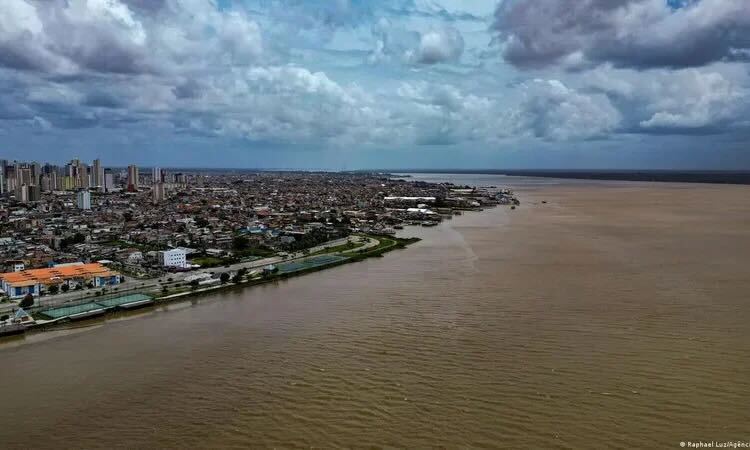
Belém was confirmed as the host city for COP30 in December 2023 – Photo: Raphael Luz/Agência Pará
Laudato Si’ Movement is grateful for the publication of this article as part of a series of articles about COP30 written by the Bishops of Brazil.
Monsignor Eduardo Malaspina
Bishop of the Diocese of Itapeva, São Paulo
Bishop for the Pastoral of Integral Ecology of Southern Region number 1 of the Brazil Conference of Bishops
Historically, the Church has understood the biblical mandate of “subduing the earth” (Gen 1:28) not as a license for unbridled exploitation, but as a radical call to responsibility. The encyclical Laudato Si’ (FRANCIS, 2015) represents a hermeneutical milestone in this journey by calling Christians and all humanity to ecological conversion, a concept that integrates spiritual, ethical, and social transformation (FRANCIS, 2015, p. 216-221). It compels us to overcome the technocratic and anthropocentric paradigms, reordering relationships from the perspective of “care” – the hermeneutical key of integral ecology.
Ecological conversion, in light of the Christian tradition, requires above all a profound examination of personal and collective consciousness, capable of recognizing and naming the structural sin of economic extractivism, consumerism, and global indifference, whose impacts fall disproportionately on so many extreme situation scenarios, such as the Amazon and its Indigenous peoples (REPAM, 2019; FRANCIS, 2015, p. 48-52). The Synod for the Amazon deepened this perspective by declaring that environmental degradation is inseparable from social injustice — dimensions that COP30, which will be held in Belém, cannot ignore (SYNOD FOR THE AMAZON, 2019). The encyclical letter proposes that care for the Common Home translates into effective public policies, intercultural dialogue, and the promotion of sustainable communities, all anchored in a spirituality that recognizes creation as “a gift which we have freely received and must share with others” (FRANCIS, 2015, p. 236).
In the context of Easter—the memory of the resurrection of Our Lord Jesus Christ and the possibility of vital renewal for human beings—ecological conversion presents itself as an expression of active hope, called to guide not only major global debates but also daily practices. The Magisterium of the Church, especially in recent decades, has encouraged this reflection through various papal encyclicals that consistently address the topic (SLEUTJES, 2023, p. 38-51). Included in the Jubilee Year, in which Pope Francis proposes a “social covenant to support and foster hope” (FRANCIS, 2024), this meeting of leaders at COP30 is invited to adopt a perspective that, starting from the present, yields hopeful fruits for the future, not under the influence of ideologies, but guided by the honest desire to promote the common good and human dignity also in matters related to integral ecology.
All of this requires ongoing formation, leadership by the youth (MACHADO, 2023, p. 85), public advocacy, and institutional testimony: from regenerative agriculture projects to the redirection of corporate and government investments toward ethical and sustainable alternatives. The commitment to participate purposefully in COP30, then, is not only strategic for the ecclesial mission, but constitutes an ethical and prophetic expression of following Christ, the Shepherd who “came that they may have life” (Jn 10:10)—including all Creation.
By addressing ecological conversion, the Catholic Church offers COP30 foundations that enrich responses to the global environmental crisis. Synodality stands out in this context, conceived as a participatory method capable of promoting dialogue and consensus-building amidst the diversity of perspectives (CZERNY, 2022).
The Christian concept of creation as a gift, linked to human dignity and the common good, underpins an ethics of care that transcends strictly technical sustainability (FRANCIS, 2015, p. 67-78). The Catholic Social Teaching proposes integrated policies that promote environmental and social justice, as evidenced in Laudato Si’ and the Synod for the Amazon (FRANCIS, 2015, p. 137-162). Principles such as solidarity, the universal destination of goods and the option for the poor emerge as relevant ethical bases for climate debates. In this way, the Catholic Tradition offers contributions that favor dialogue between governments and civil society, adding to global efforts to preserve our Common Home.
References
HOLY BIBLE. Translation by CNBB. Brasília: CNBB Editions, 2020.
CZERNY, Michael. A Church which “journeys together”: Synodality in the era of Pope Francis. Theological Perspective, [S. l.], v. 54, n. 1, p. 67, 2022. DOI: 10.20911/21768757v54n1p67/2022. Available at: https://www.faje.edu.br/periodicos/index.php/perspectiva/article/view/5009. Accessed on: April 19.
FRANCIS. Laudato Si’: On Care for Our Common Home. Available at: https://www.vatican.va/content/francesco/en/encyclicals/documents/papa-francesco_20150524_enciclica-laudato-si.html
FRANCIS. Spes non confundit: Bull of Indiction of the Ordinary Jubilee of the Year 2025. Available at: https://www.vatican.va/content/francesco/en/bulls/documents/20240509_spes-non-confundit_bolla-giubileo2025.html
MACHADO, Luciano. Laudato Si’: educational practice for an integral ecology. São Paulo: Dialética, 2023
REPAM. Amazon: Common Home, Journey of Hope. São Paulo: Paulus, 2019.
SYNOD FOR THE AMAZON. Final Document. Vatican: Libreria Editrice Vaticana, 2019.
SLEUTJES, Luiz. Integral Ecology and Signs of the Times. São Paulo: Pluralidades, 2023.





